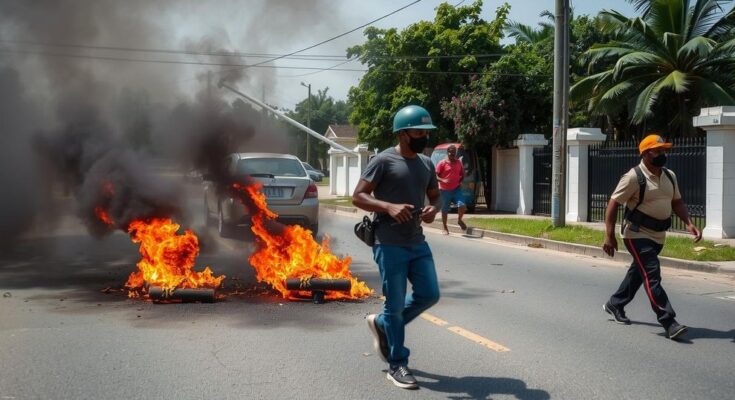Major cities in Mozambique experience significant unrest following the confirmation of the ruling Frelimo party’s election victory. Protests led to business closures, looting, and clashes with the police, resulting in numerous fatalities. Opposition forces accused the government of electoral fraud, and analysts have called for urgent dialogue to avert a deeper crisis. The UN has expressed its concern and called for peaceful resolutions to restore stability in the country.
In Mozambique, major urban centers have been severely impacted by escalating unrest following the controversial results of the October presidential election. The ruling Frelimo party, now in power for 50 years, experienced a resurgence in violence and public dissent, particularly after the Constitutional Council confirmed their candidate, Daniel Chapo, as the election winner—a decision that has been met with widespread accusations of electoral fraud. As opposition-led protests erupted, cities like Maputo and Matola witnessed significant disruptions in commerce and public services, including the closure of banks and cessation of public transportation.
The protests, which began as a response to the court’s ruling, have resulted in looting and clashes with law enforcement, contributing to a tragic increase in fatalities. Witness accounts detail looting incidents, where residents reported seeing crowds stealing household appliances and other items. One local described the chaos, stating, “The people I saw ran away and broke glass. I saw everything that was happening. They took microwaves, televisions, beds. This should not happen because they are ruining many things, and they cannot behave like this.” Unfortunately, these disturbances have led to multiple deaths, including tragic incidents such as a fire in a food warehouse that killed at least 11 individuals.
In addition to the violence, the unrest has propelled political tensions to new heights, with opposition leaders accusing police of exacerbating the situation. Venancio Mondlane has openly challenged the election outcomes and called for sustained protests, emphasizing the need for accountability and cautioning against further property damage. His rhetoric highlights a deep discontent with the ruling party’s governance, as he lamented the widespread suffering and ongoing struggles of the citizens.
The recent unrest has generated significant unrest in Mozambique; since the elections, the violence has claimed 248 lives and left hundreds wounded. The onset of the unrest also saw the escape of approximately 1,500 prisoners during a recent prison break, raising additional security concerns.
In reaction to the escalating violence, the United Nations has expressed grave concern over the situation, urging political dialogue among leaders to mitigate further violence. UN Secretary-General Antonio Guterres has called for urgent dialogue and legal measures to address the grievances of the populace, emphasizing peace and constructive resolutions as vital for the nation’s future stability.
The turmoil in Mozambique follows a prolonged political tension which has characterized the nation since its first multiparty elections in 1994. The Frelimo party, which has maintained an unbroken rule since Mozambique’s independence from Portugal in 1975, faces increasing pressure from opposition groups and a populace weary of economic hardship and governance issues. The recent election cycle has been marred by allegations of vote rigging and mismanagement, culminating in widespread civil unrest following the Constitutional Council’s validation of the contested election results. These dynamics are framed against a backdrop of historical strife, including a civil war from 1977 to 1992 and ongoing challenges with poverty, unemployment, and corruption, all contributing to a tense socio-political climate. The current unrest appears to be a tipping point in public frustration with systemic issues and perceived injustices in political representation.
In summary, the post-election unrest in Mozambique reflects deep-seated grievances against decades of rule by the Frelimo party, exacerbated by allegations of electoral fraud and oppressive governance. Major cities are grappling with the consequences of widespread protests that have resulted in significant social turmoil, loss of life, and damage to property. The international community and local leaders call for constructive dialogue to find peaceful resolutions and restore stability to the nation, underscoring the urgency of addressing the underlying issues that provoke such unrest. Without meaningful discourse and reform, Mozambique risks further escalation of conflict and instability.
Original Source: www.dw.com




